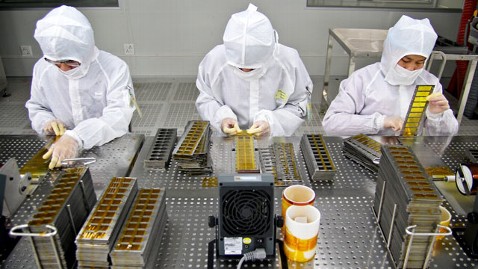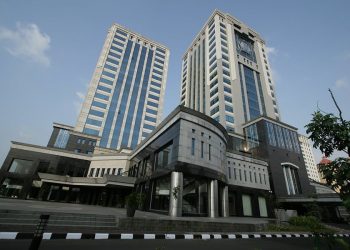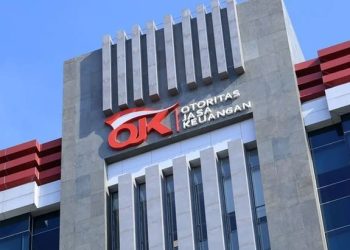Jakarta, Indonesia Sentinel — Apple has announced its plan to build a manufacturing facility for AirTags in Batam, Indonesia, marking a significant investment in Southeast Asia’s growing tech industry. The news came during a meeting between Apple executives and Rosan Roeslani, the Minister of Investment and Head of the Indonesia Investment Coordinating Board (BKPM), on Tuesday, January 7, 2025.
“Essentially, they discussed and made a full commitment to the first phase of the AirTag project, with an investment of US$1 billion,” Rosan told reporters at the Ministry of Investment and BKPM headquarters on Wednesday, January 8, 2025, as reported by Detik.com.
Commitment to a US$1 Billion Investment and 2026 Completion
In the meeting, Apple’s representatives, including Vice President of Global Policy Nick Amman, presented the proposed location for the new factory. Minister Rosan was shown the specific plot of land where the factory will be developed. The factory is scheduled to be completed by early 2026, although a precise construction timeline has yet to be confirmed.
The Batam facility is expected to create approximately 2,000 new jobs, with a significant portion of Apple’s AirTag production to be sourced from this plant. “It is expected that 65% of Apple’s AirTag production will come from this Batam facility,” Rosan added.
Plans to Expand Vendor Partnerships
Rosan further elaborated that the Indonesian government is committed to attracting other vendors to join the initiative, creating an ecosystem of suppliers that could drive further investments into the region. “We expect the US$1 billion commitment from Apple to grow, especially with the potential to engage other vendors. If we look at countries like Thailand, with over 23 vendors, or Vietnam, which has more than 30 vendors, we believe Indonesia can achieve similar results,” Rosan explained.
The investment model is expected to mirror those used in other Southeast Asian countries, creating a competitive environment for manufacturing and technological development. However, Rosan also noted that this commitment from Apple is still in its early stages.
Additional Discussions with the Ministry of Industry
In addition to the meeting with Rosan, Apple’s delegation also visited the Ministry of Industry on the same day. The meeting lasted for about three hours, with discussions focusing on Apple’s proposals for extending the Domestic Content Requirement (TKDN) in Indonesia.
Minister of Industry Agus Gumiwang Kartasasmita mentioned that his initial meeting with Apple lasted 30 minutes, followed by technical talks led by Setia Darta, the Director General of Metal, Machinery, Transportation, and Electronics Industry at the Ministry of Industry. Setia shared that the meeting primarily addressed Apple’s proposal for extending TKDN and that his team had provided feedback on the points raised by Apple.
“We have received their proposal for extending the TKDN, and we have provided our counter-proposal. They are now considering it and will review it further,” Setia said.
Uncertain Future for iPhone 16 Production in Indonesia
However, the future of Apple’s iPhone 16 production in Indonesia remains uncertain. Setia emphasized that no agreement has been reached yet on the production of the upcoming iPhone model in the country. “As the Minister mentioned, this will not be a one-hour or one-day meeting. It can take a month, or even a week. This is still a process,” Setia added, referring to the ongoing discussions about local production requirements for future Apple products.
Strategic Implications for Indonesia’s Tech Industry
The establishment of an Apple AirTag factory in Batam signals a significant step in the expansion of Indonesia’s tech manufacturing sector. The project aligns with Indonesia’s broader goal of becoming a key player in the global supply chain for electronics and consumer goods. It also demonstrates the country’s attractiveness as an investment destination in Southeast Asia, especially with the growing demand for technological products.
Apple’s investment could pave the way for other multinational companies to consider Indonesia as a hub for manufacturing and innovation. Additionally, the country’s strategic location and competitive labor costs make it a viable alternative to other regional manufacturing centers such as China and Vietnam.
Ace Hardware Leaves Indonesia, Rebrands Under New Name AZKO!
Conclusion: A Milestone for Indonesia’s Growing Tech Ecosystem
Apple’s US$1 billion commitment to building the AirTag factory in Batam is a major milestone for Indonesia’s growing role in the global tech ecosystem. The project promises to bring new jobs, investments, and opportunities for local businesses, while also positioning Indonesia as a key player in the Southeast Asian manufacturing landscape. As discussions with the Indonesian government continue, this venture could serve as a catalyst for further technological advancements and industrial growth in the region.
(Becky)


























